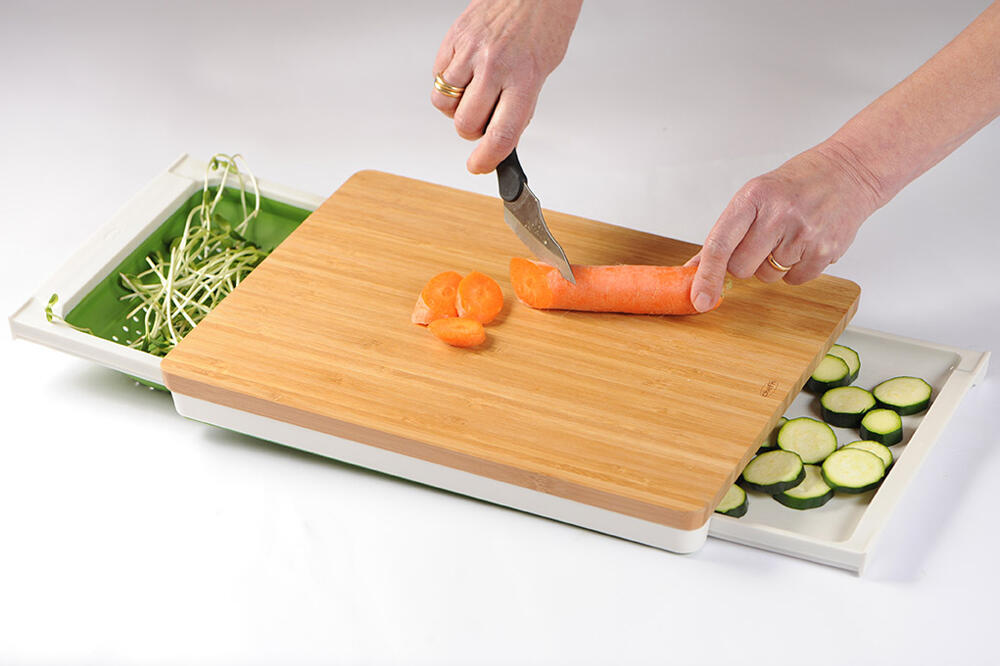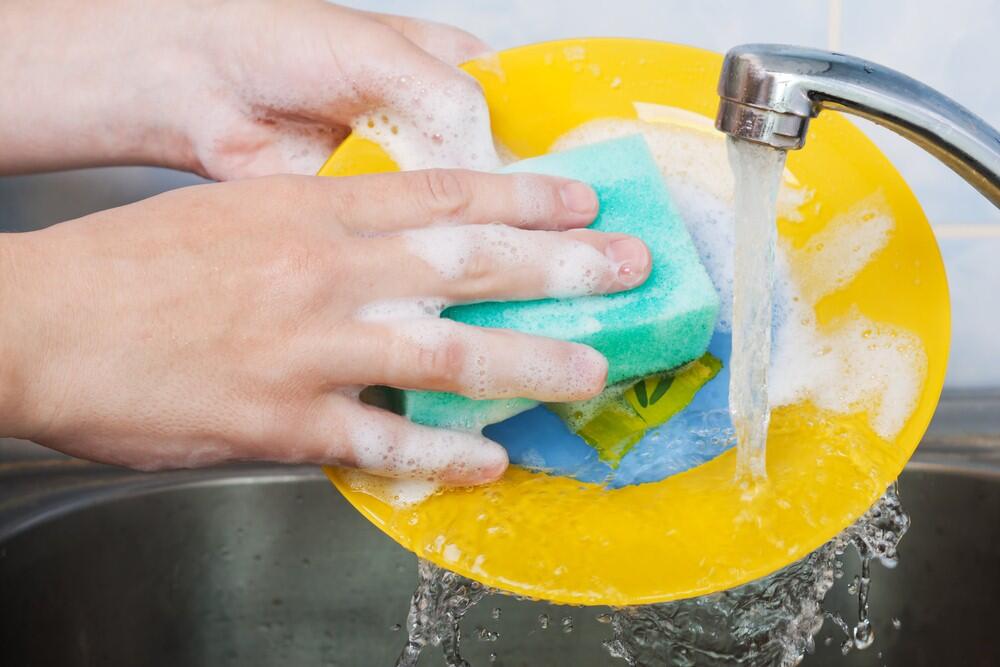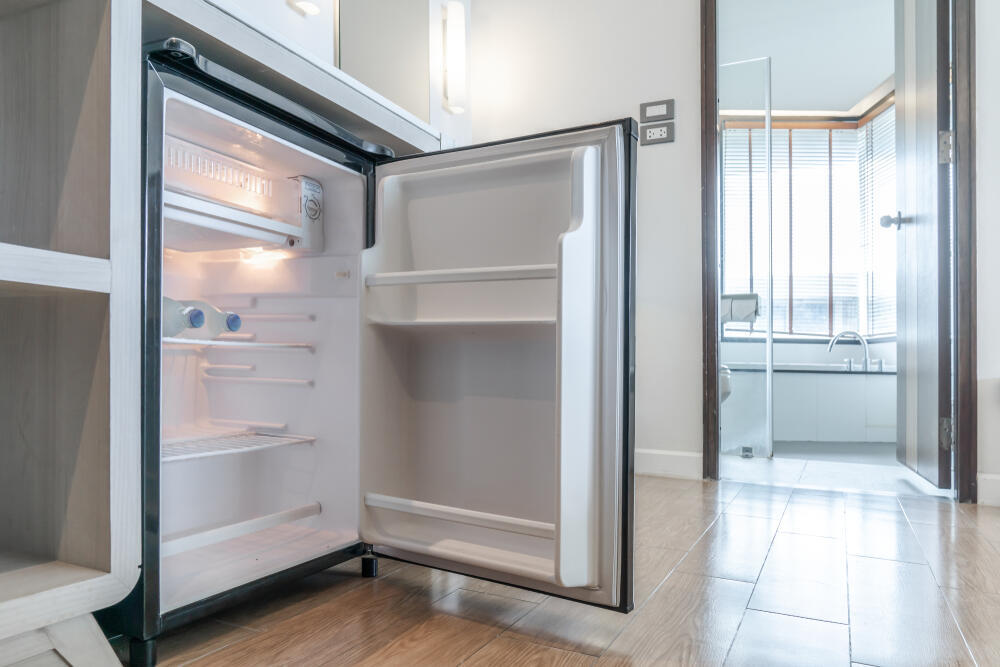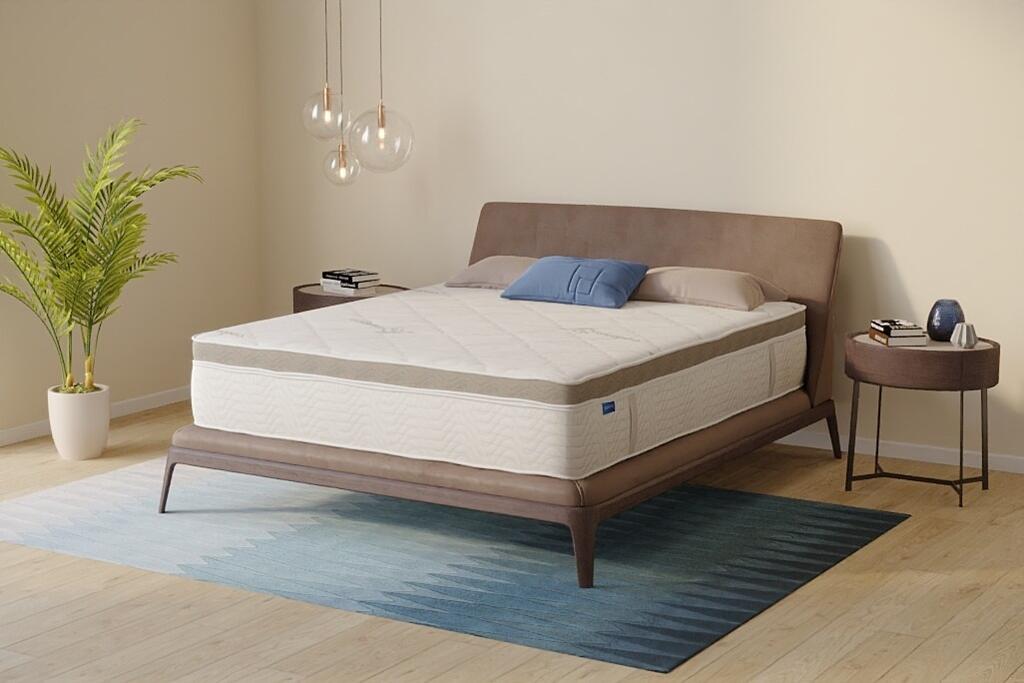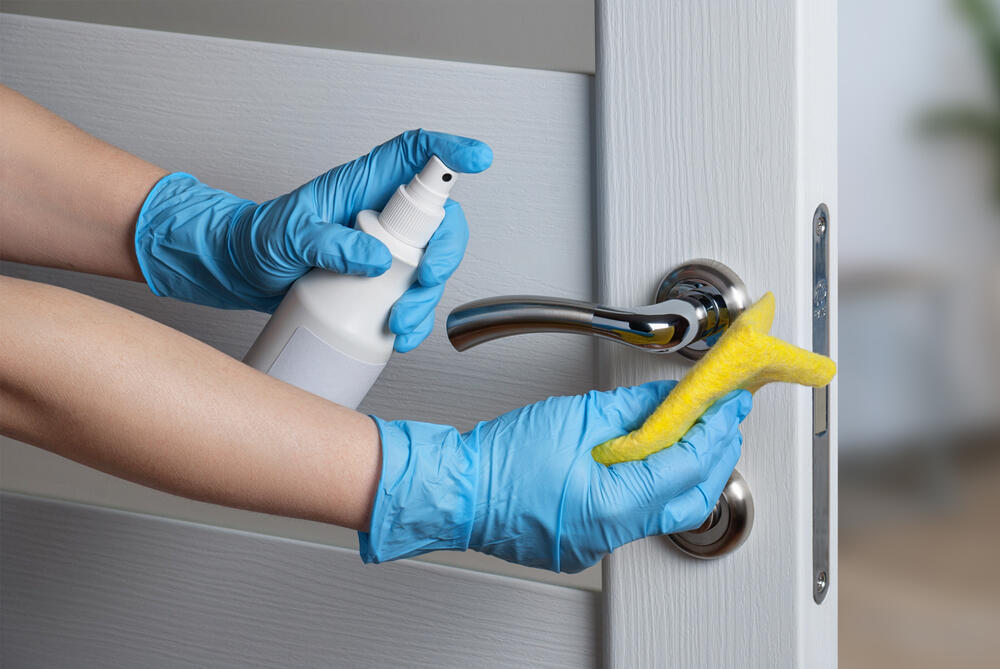Kitchen
Cutting board - It's essential to properly maintain a cutting board, commonly used for cutting meat, fish, vegetables, and fruits, to avoid health hazards. Vegetables and fruits, in particular, should have a separate cutting board, as they are usually not subjected to cooking, which would eliminate some of the pathogens.
Other stories:
When cleaning a cutting surface, be it plastic or wood, scrub both sides with soapy water and rinse thoroughly with warm water. You can also use a diluted bleach solution (one tablespoon per liter of water) to disinfect the surface. After cleaning, allow the board to air dry.
Avoid putting the board in the dishwasher as it may cause cracks, which can harbor bacteria. If the board has many cracks, it is recommended to replace it with a new one.
Surfaces, spice racks, kitchen sink - Daily cleaning is recommended for all surfaces in the kitchen, as they are highly susceptible to bacterial contamination. According to a 2022 study published in the Journal of Food Protection, spice storage containers are the most contaminated kitchen item, with around 50% of them harboring pathogens. Cutting boards came in second, while trash can lids were third. Faucet handles were found to have the lowest contamination rate during food preparation.
To maintain kitchen hygiene, it's essential to follow these steps:
- Wash your hands with soap and water before handling kitchen utensils or food.
- Clean kitchen surfaces daily, especially after preparing food. This includes countertops, oven and microwave handles, stove knobs, and spice containers used for cooking.
- Use disinfectants approved by the Ministry of Health to wipe down surfaces.
Kitchen towels - The University of Mauritius conducted a study on 100 kitchen towels, revealing that 50% carried pathogens and more than one-third tested positive for fecal bacteria from the coliform family, posing a risk of food poisoning.
Additionally, MRSA bacteria were found in higher frequency in towels in homes where meat consumption is higher. It is recommended to use paper towels instead of cloth towels, but if cloth towels are used, they should be changed frequently (once every 1-3 days depending on use), washed at a high temperature, and air-dried.
Dish sponge - It is recommended to clean dish sponges once a week, as a study published in Scientific Reports in 2017 found that used sponges are home to 362 different species of bacteria.
A cubic inch of sponge was found to have a bacterial density similar to that of human feces, with about 82 billion bacteria. Moraxella Osloensis, a bacterium that can cause inflammation and infections in people with weak immune systems, was also found among the bacteria.
To clean a sponge, replace it with a new one once a week or sooner if it emits a bad smell. During use, keep the sponge wrung out and in a dry area. If you want to reuse the sponge, wash it in the washing machine at the highest temperature setting and target it for cleaning less hygiene-sensitive areas, such as the bathroom.
Kitchen apron - Frequency of cleaning: Weekly or every three days, depending on usage. The kitchen apron, often worn while cooking and baking, can easily accumulate bacteria from food particles, especially in the front pocket area.
It can also get contaminated when worn in other areas of the house, so it is advisable to take it off before visiting the bathroom.
The cleaning process is simple, wash the apron in the washing machine using a hot water cycle and a disinfectant detergent. Make sure to remove any stains or visible dirt before washing.
Avoid using fabric softeners as they can reduce the effectiveness of the detergent. After washing, air dry the apron in direct sunlight or in a well-ventilated area to prevent bacterial growth.
Fridge - It's a common misconception that refrigerators are immune to bacteria and mold. However, if not cleaned regularly, they can become a breeding ground for germs that can spoil your food and leave behind unpleasant odors.
How to clean: Remove all food items, discard any expired or spoiled items, and sort the remaining items. Use a damp cloth and an approved disinfectant to thoroughly wipe the inside of the refrigerator and dry with a paper towel.
Pay extra attention to the refrigerator door and handles, as they are touched frequently. Once a month, do a deep clean by removing shelves and drawers and washing them with soap and water. Clean the rubber seals on the doors using a soft brush.
Bedroom
Sheets - Our beds may seem like a sanctuary, but according to a 2021 research paper by microbiologists from the University of Westminster, UK, the accumulation of dead skin cells, sweat, saliva, food crumbs, and other particles in our bedding can quickly create a thriving environment for bacteria, fungi, and viruses.
To maintain hygiene, it is recommended to wash bedding at a high temperature of 40-60 degrees once a week. Additionally, on sunny days, consider airing out bedding, including pillows and blankets, in the sun.
Mattresses - Similar to bedding, mattresses can also accumulate pathogens and allergens over time. To maintain a clean sleeping environment, consider taking the following steps:
- Use a mattress protector and wash it every one to two weeks to prevent any accumulation of dust or dirt.
- Vacuum the mattress once a month and flip it occasionally to distribute the wear and tear evenly.
- If you have allergies, consider investing in a hypoallergenic mattress or a dust-resistant cover to reduce your exposure to potential allergens.
Ceiling fans - To prevent dust, dirt and grease from accumulating on the blades of your fan and potentially affecting the quality of the air you breathe, it's important to clean it regularly.
Cleaning is fairly straightforward. We recommend cleaning the fan blades every two to three months. You can use a damp cloth to wipe the blades thoroughly and remove any buildup.
Living room
TV remote - The remote control in the living room is frequently touched by all family members, often while eating, scratching, or after using the bathroom. As a result, it is considered the object in the living room that is most likely to carry pathogens.
To clean it, use antibacterial wipes to clean the surface of the remote control once a week. Use a cotton swab to remove any food crumbs or debris that may have accumulated between the keys.
Air conditioner - Improperly maintained air conditioners can contain molds, which are fungal spores that thrive in moist environments. Air conditioners, refrigerators, bathrooms, toilets, washing machines, and dryers can all be breeding grounds for molds. Moisture accumulates in an air conditioner that runs intermittently, which can lead to mold growth. When the air conditioner is turned back on, the spores are released into the air and can cause respiratory and skin problems, particularly in individuals with allergies, asthma, and lung diseases.
How to clean: To prevent mold growth, it is recommended to clean the air conditioner's filters once a month. Take the filters out and wash them thoroughly with running water and scotch tape. Allow them to dry completely before reinstalling them.
Smartphone - Our best friend in the whole world, right? Our smartphones, which we handle multiple times a day, carry a multitude of germs and bacteria that could easily transfer to our hands, face, and other surfaces.
This risk is amplified when we take our phones into the bathroom, where water particles and bacteria can accumulate on their surface. Moreover, the heat generated by the phone could increase the multiplication of disease-causing bacteria such as salmonella and E. coli.
It is advisable to clean your phone once a day or every two days with a soft cloth that has been moistened with a solution of water and rubbing alcohol. Alternatively, you can use a disinfectant wipe that is safe for electronic devices. Be sure to clean all areas of the phone, including the buttons, back, and edges.
Carpets and upholstery - It has been found that carpets and upholstery are problematic due to the presence of dust mites and fecal bacteria. A recent study published in Indoor and Built Environment examined the number of fecal bacteria that New Yorkers bring into their homes after walking on city streets.
The study discovered that the carpets in homes had a significant concentration of fecal bacteria, which likely came from the sidewalks onto the soles of shoes and then into the carpets.
Dust mites have also been found to trigger allergic reactions, which can result in symptoms like sneezing, runny nose, and watery eyes. To address these issues, carpets and upholstery should be cleaned once a week.
Carpets and upholstery are breeding grounds for dust mites and fecal bacteria, which can trigger allergic reactions and cause health problems. A recent study showed that New Yorkers bring a high concentration of fecal bacteria from city streets into their homes, which eventually ends up on their carpets.
To reduce the presence of dust mites, it is recommended to thoroughly vacuum carpets and upholstery on a weekly basis. Additionally, turning the carpet over once every two or three weeks can help.
If concerned about bacteria and viruses, consider replacing fabric sofas with ones made of leather-like material and carpets with parquet, as parquet and flooring surfaces tend to contain fewer fecal bacteria.
When cleaning, remember to move furniture and wash panels and corners of the room thoroughly, as dust tends to accumulate in these areas.
Switches, handles and knobs - It's essential to keep the switches, buttons, and handles of electrical appliances clean as they frequently come in contact with our hands.
Besides, due to the electric current, switches tend to get warm, which makes them an ideal breeding ground for bacteria. The same goes for buttons of various electrical appliances.
To keep them clean, it is recommended to use a cloth containing an antiseptic and dry them well. You should clean them at least once a week, even after hosting guests, and if anyone in the family has a viral disease, clean them daily until they recover.
Bathroom
Sink and bathtub - Cleaning the bathroom sink and faucet handles regularly is important to keep them free of harmful bacteria. You can use disinfectant wipes daily and a sponge with disinfectant twice a week as you clean the bathroom.
It's essential to choose the right cleaning method that matches the material from which they are made, as strong disinfectants may damage their coating.
As for the bathtub, it's recommended to clean it once or twice a week. Start by spraying the entire tub with a dedicated disinfectant and wait a few minutes for it to work.
Then, scrub the tub with a clean sponge, rinse thoroughly with water, and dry it with a cloth. This helps to remove soap scum, dirt, and harmful bacteria from the surface of the tub.
Towels - Towels are known to be a potential breeding ground for disease-causing bacteria, as they are often found in humid environments and pass through many hands.
Hand towels should be changed and washed every two days, while bath towels can be used 3-4 times before washing. Washing them at a high temperature of more than 60 degrees can effectively kill the bacteria.
It is also recommended to assign separate towels for sick family members and wash them at a high temperature after use. Additionally, consider hanging towels outside in the sun to benefit from the natural disinfectant properties of ultraviolet (UV) rays.
Tiles - Mold is a type of fungus that thrives in warm and humid conditions and spreads through spores. When left unchecked, it can affect the quality of the air we breathe and cause health problems such as runny nose, eye infections, and asthma, especially in people with weakened immune systems or allergies.
To prevent mold growth, it is important to clean bathroom tiles once a week using a designated material and surfaces with mold using a solution of equal parts water and vinegar or designated cleaning agents.
Additionally, it's crucial to ensure proper ventilation of the bathroom and the house in general.
Showers - Cleaning the shower and its fixtures is an important task as they can accumulate various types of buildups like scale, rust, bacteria, and even mold due to constant exposure to water and dust.
If left uncleaned, the bacteria can enter the body during a shower and result in respiratory issues, fatigue, and a dry cough. It is recommended to clean the shower and its fixtures at least once a week to prevent the buildup of harmful substances.
To keep your shower clean and free from harmful bacteria, make sure to dry the faucet heads or marker with a dry cloth after each use. Once a week, use a designated scale remover to clean the shower heads, following the instructions on the product label.
Alternatively, you can mix water and vinegar in a 1:4 ratio and apply the solution to the faucets with a cloth. After waiting a few minutes, rinse the shower head with clean water and wipe it dry.
If you haven't used the shower in a few days, turn on the hot water and let it flow for a minute to flush out any bacteria that may have accumulated. It's recommended to leave the room during this process to avoid being splashed with bacteria from the shower head.
Toilet - Toilets should be cleaned daily due to the high risk of bacterial infections associated with flushing. A study published in the Clinical Infectious Disease Journal found that 60% of patients with diarrhea caused by Clostridium difficile were infected by fecal bacteria that had spread over a distance of several tens of centimeters from the toilet bowl.
To clean the toilet, it is important to close the lid before flushing to prevent bacteria from spreading. Use an antibacterial wipe to clean the toilet buttons and electrical switches in the bathroom daily.
Clean the inside of the toilet bowl and the lid with a designated cleaning material daily, and use bleach twice a week. Additionally, wash your hands thoroughly with soap and water after each visit to the bathroom and ventilate the bathroom space as much as possible.
Shower curtain - Soap residue can build up on a fabric shower curtain due to humidity and warmth, providing a breeding ground for mold and bacteria. It's important to clean it once a month to prevent the growth of harmful microorganisms.
To clean the shower curtain, you can either wash it in the washing machine with a half cup of baking soda and a clean white towel, which will help to loosen dirt and prevent wrinkles, or you can sprinkle baking soda on a damp microfiber cloth and rub it over the surface. Rinse with water and wipe it dry with a clean cloth.


